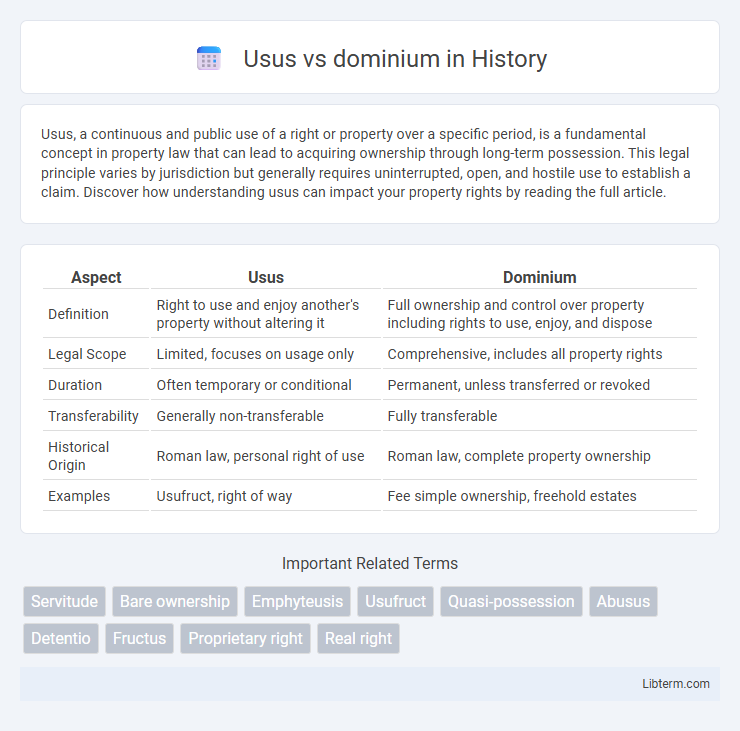Usus, a continuous and public use of a right or property over a specific period, is a fundamental concept in property law that can lead to acquiring ownership through long-term possession. This legal principle varies by jurisdiction but generally requires uninterrupted, open, and hostile use to establish a claim. Discover how understanding usus can impact your property rights by reading the full article.
Table of Comparison
| Aspect | Usus | Dominium |
|---|---|---|
| Definition | Right to use and enjoy another's property without altering it | Full ownership and control over property including rights to use, enjoy, and dispose |
| Legal Scope | Limited, focuses on usage only | Comprehensive, includes all property rights |
| Duration | Often temporary or conditional | Permanent, unless transferred or revoked |
| Transferability | Generally non-transferable | Fully transferable |
| Historical Origin | Roman law, personal right of use | Roman law, complete property ownership |
| Examples | Usufruct, right of way | Fee simple ownership, freehold estates |
Understanding Usus and Dominium: A Semantic Overview
Usus refers to the right to use or enjoy a property without altering its substance, whereas dominium signifies full ownership, including the right to use, enjoy, and dispose of the property. Understanding the distinction clarifies that usus is a limited real right, primarily concerned with possession and use, while dominium encompasses comprehensive legal control and transferability. This semantic differentiation is critical in property law to delineate rights and responsibilities between users and owners.
Historical Evolution of Property Rights: Usus vs Dominium
The historical evolution of property rights reveals a fundamental distinction between usus and dominium, where usus represented the right to use or enjoy a property without full ownership, while dominium denoted absolute ownership and control. Rooted in Roman law, usus initially allowed individuals limited access to property for personal use, reflecting communal or usufructuary arrangements, whereas dominium evolved as exclusive, transferable legal ownership. Over time, legal systems differentiated these concepts to balance personal use rights with comprehensive ownership, shaping modern property laws worldwide.
Legal Definitions: Clarifying Usus and Dominium
Usus refers to the legal right to use or enjoy a property without altering its substance, allowing possession but not ownership. Dominium denotes full ownership rights, including control, use, and disposition of the property, enabling the owner to transfer or encumber it. Clarifying these distinctions aids in understanding property rights, especially in civil law systems where usus often coexists with dominium under usufruct arrangements.
Usus Explained: Meaning and Scope
Usus refers to the right to use or enjoy a property without altering its substance, allowing the holder to benefit from the asset through personal use or enjoyment. The scope of usus typically includes non-transferable rights limited to the user's personal and immediate use, distinguishing it from dominium, which encompasses full ownership including rights to possess, use, and dispose of the property. Understanding usus is essential in property law as it defines the legal boundaries where use does not equate to ownership, often applicable in usufruct or life estate arrangements.
Dominium Demystified: Types and Characteristics
Dominium refers to the legal ownership of property, encompassing absolute rights to possess, use, and transfer assets. Types of dominium include dominium plenum (full ownership), dominium utile (beneficial ownership), and dominium directum (superior ownership with rights to control or lease). Characteristics of dominium emphasize exclusivity, perpetuity, and enforceability, distinguishing it from mere possession or usus, which is limited to the right of use without transferability or full control.
Usus vs Dominium in Modern Property Law
Usus refers to the right to use or enjoy a property without owning it, while dominium signifies full ownership and control under modern property law. Usus grants limited, often temporary rights like usufruct or easements, allowing possession without transferring title or full authority. Dominium encompasses all property rights, including possession, use, and disposal, establishing the owner's absolute legal authority over the asset.
Key Differences Between Usus and Dominium
Usus refers to the right to use or possess a property without owning it, emphasizing mere usage or enjoyment. Dominium represents full ownership with comprehensive rights, including control, transfer, and exclusion of others from the property. The key difference lies in dominium granting complete legal ownership, while usus provides only limited, non-transferable use rights.
Practical Applications: Real-Life Examples
Usus vs dominium distinctions play a crucial role in property law, particularly in lease agreements where lessees have the right to use (usus) a property without owning it (dominium). For example, a tenant's right to live in and use an apartment illustrates usus, while the landlord retains dominium, holding full ownership rights including selling or mortgaging the property. In agricultural contexts, farmers may have usus rights to cultivate land owned by others, with dominium remaining with the landowner, affecting legal responsibilities and transferability.
Usus, Dominium, and Ownership Structures
Usus refers to the right to use or enjoy a property without owning it, often granted through leases or usufruct agreements, distinguishing it from dominium, which denotes full ownership rights including control, use, and transfer of property. Ownership structures can separate usus and dominium, as seen in usufruct arrangements where one party holds the right to use a property (usus) while another retains the legal title or ownership (dominium). This separation allows for flexible property management and investment strategies by dividing possession and ownership interests.
Contemporary Relevance of Usus and Dominium
Usus and dominium retain critical importance in contemporary property law by distinguishing between mere usage rights and full ownership rights, affecting how assets are managed and transferred. Usus allows individuals or entities to utilize property without transferring title, crucial in lease agreements, usufructs, and intellectual property licensing. Dominium, representing absolute ownership, provides full control and legal authority over property, underpinning real estate transactions, inheritance laws, and corporate asset management.
Usus Infographic

 libterm.com
libterm.com